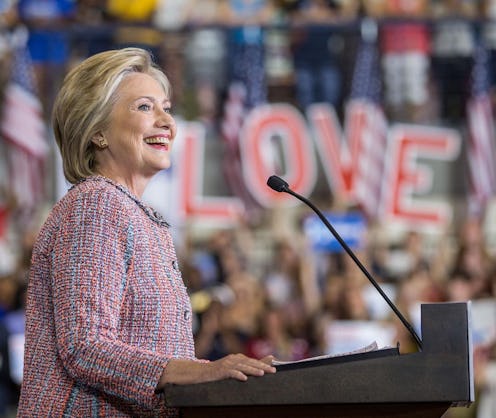I was born in the early '80s (circa the Paleolithic era), when women began entering the corporate world en masse. Power suits came to prominence around this time, a look soon made iconic by Melanie Griffith's character in 1988's Working Girl. They were adopted to neutralize femininity, so that men could take their new colleagues—no longer limited to the position of secretary—seriously. Hillary still employs this tactic, to mixed effect (here is a great article on how her pantsuits signify "an uneasy compromise between gender and power").
My mom wore these suits when she went to work every day throughout my childhood. Despite this clear and personal example of a woman in power (moderate though that power was), it never occurred to me as a child that a woman could one day be president. I don't know what kids are learning in 2016, but the history books we studied in the '80s and '90s featured only a handful of notable women (e.g., Susan B. Anthony and Harriet Tubman), and the leaders we idealized were never female.
@hillaryclinton
The Misogynistic Past
To make matters worse, the culture I grew up in—I'll decline to call out the state by name—was one steeped in misogyny. Despite my mom’s obvious badassery (it's a word!), derogatory, stereotypical comments about women were the norm in the households in which I both lived and frequented. (On the flip side, the men I knew were supposed to conform to their own restrictive gender stereotypes, which meant they couldn't show weakness or emotion of any kind.) My three brothers were allowed certain behaviors and enrolled in certain activities, and if I ever questioned why I wasn't able to follow suit, the response was simply "because they're boys." Boys were aggressive, strong, ambitious and smart. Girls were pleasing and disciplined and inexplicably did all the cooking. It was innate to me, as a young girl, that women were second-class citizens.
Present-Day Defeat
As I've grown older and been exposed to a world outside of the one in which I was raised, this early reality has become increasingly infuriating and I still often cringe around some of my well-meaning family members who are, I hope, relics of a bygone era. I want to live in a world in which none of us have to inhabit these arbitrarily-specified roles, and in which women know, innately, that they are equal to men. Hillary Clinton's presidency would have meant that my future daughter could take for granted that women can aspire to what is arguably the most prestigious job in the world and, it follows, anything else she set her mind to.
If Trump wins, will all girls be slaves?
Instead, every misogynistic thing Donald Trump has said—of which there are many—has been legitimized. Last night, CNN commentator Van Jones grappled with how he was going to talk to his kids about this election, saying "You tell your kids, 'Don’t be a bully.’ You tell your kids, ‘Don’t be a bigot.’ You tell your kids, ‘Do your homework and be prepared.’ And then you have this outcome, and you have people putting children to bed tonight, and they’re afraid of breakfast. They’re afraid of ‘How do I explain this to my children?'" While he didn't make specific mention of gender politics, many women—who had excitedly taken their young daughters along to the polls yesterday—found themselves in an equally uncomfortable predicament. One tweet making headlines today drove the implications of Trump's election on the psyche of young women home today. It read, "My niece asked us "If Trump wins, will all girls be slaves? A girl in my class told me that."
Why We Must Press On
It's likely that we would have faced four to eight years of insidious misogyny even if Clinton been elected. The difference is that it's now been sanctioned, which makes it even more important for us to stand up in defiance and remain determined to elect women into positions of political power. As a writer for The Cut quite compellingly phrased it earlier today, "Don’t wear a “The Future Is Female” shirt if you can’t name three female politicians you’d like to see hold higher office in the future." Hillary may have been our most promising opportunity for equality to date, but she is not our only opportunity. If you feel, as I do, disgusted that a blatant misogynist could win the highest office in the country, depressed that issues like paid leave will no longer be a priority for our commander-in-chief (we were so close) and also fearful that you may lose the right to control your own life and body, this is not the time to collapse into despair. There are women out there representing you in politics right now—in fact, women and minorities made history in the U.S. Senate last night—and some of them will likely throw their hat in the ring in 2020. Don't wait—support them now, and be vocal about it. Let's grab this hostile-to-women political culture by the you-know-what(s).
